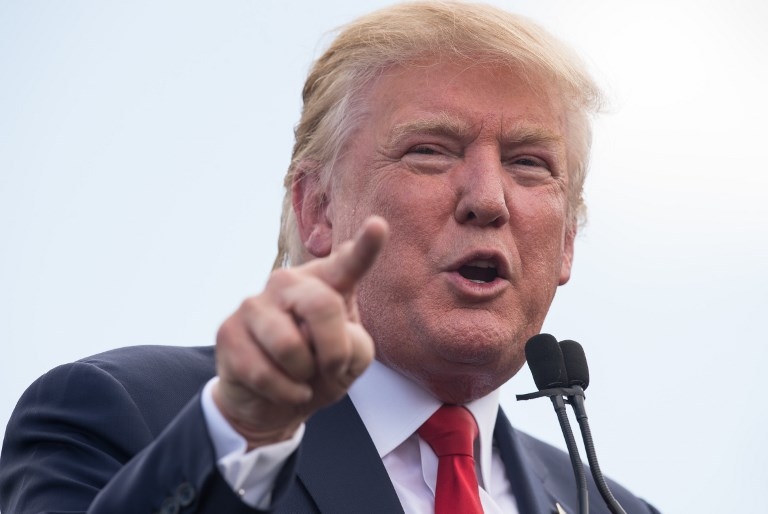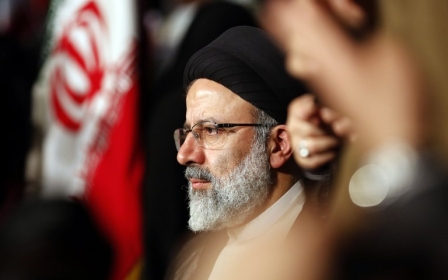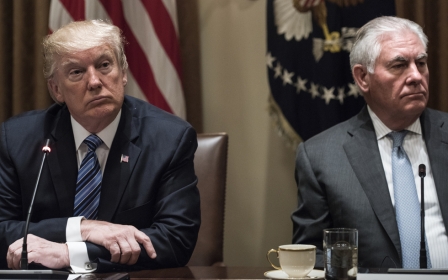Trump grudgingly signs Iran, Russia sanctions bill

US President Donald Trump grudgingly signed into law new sanctions against Iran, Russia and North Korea on Wednesday, a move Moscow said amounted to a full-scale trade war and an end to hopes for better ties with the new US administration.
"While I favour tough measures to punish and deter aggressive and destabilising behaviour by Iran, North Korea, and Russia, this legislation is significantly flawed," Trump said in a message to lawmakers.
Trump said in a separate statement that he was signing the measure "for the sake of national unity" even though he saw problems with it.
Trump has repeatedly said he wants to improve relations with Russia. That desire has been stymied by US itelligence agencies' findings that Russia interfered to help the Republican against Democratic presidential candidate Hillary Clinton.
His hands were tied after the Republican-controlled Congress approved the legislation by such a large margin last week that any presidential veto of the bill would have been overridden.
What this bill does
The new law adds sanctions to anyone involved in Iran’s ballistic missile programme, including those who “manufacture, acquire, possess, develop, transport, transfer, or use such capabilities".
It also places sanctions on anyone involved or affiliated with the Iranian Revolutionary Guard, which the US alleges "is the primary arm of the Government of Iran for executing its policy of supporting terrorist and insurgent groups".
In addition, it gives the US secretary of state the power to compile for sanctions a list of Iranian individuals who have committed human rights abuses.
The new law also adds sanctions on North Korea, including new rules to prevent foreign banks from opening US accounts to assist North Korean entities, while asking the State Department to revisit the question of whether to designate Pyongyang a state sponsor of terrorism.
Iran responds
Iran said the new sanctions break the terms of its nuclear deal with the United States and other world powers, and vowed an "appropriate and proportional" response.
"In our view the nuclear deal has been violated and we will show an appropriate and proportional reaction to this issue," Deputy Foreign Minister Abbas Araqchi said in an interview with state TV, according to the ISNA news agency.
While Russia has reacted to the sanctions by ejecting US embassy staff, Iran has no diplomatic relations or direct trade links with the United States so its options are limited. Araqchi said Tehran's response would be "intelligent".
"The main goal of America in approving these sanctions against Iran is to destroy the nuclear deal and we will show a very intelligent reaction to this action," Araqchi said.
The main goal of America in approving these sanctions against Iran is to destroy the nuclear deal
- Iran's Deputy Foreign Minister Abbas Araqchi
"We are definitely not going to act in a way that get us entangled in the politics of the American government and Trump."
The new US sanctions, signed a day before Iranian President Hassan Rouhani is sworn in for a second term, are likely to embolden his hardline critics who say the nuclear deal was a form of capitulation.
The United States is one of six countries to sign the deal with Iran, and the others - Russia, China, Britain, France and Germany - have said they see it as a success in easing concerns that Iran might be trying to develop nuclear weapons.
The deal has also meant European countries flocking back to invest in oil-rich Iran, with Total - a French oil company - agreeing to develop a new phase of the South Pars gas field, the world's largest.
Araqchi said the Europeans would not allow Trump to destroy the nuclear deal.
"What Total did and the contract that was signed between this company and Iran sent a message from Europe to the Americans that whatever the conditions they will continue their economic relations with Iran," he said.
In a separate announcement, Tehran confirmed that Rouhani would keep on two important ministers for his second term: Oil Minister Bijan Zanganeh, who is largely credited for closing the Total deal, and Foreign Minister Mohammad Javad Zarif, Iran's lead negotiator in the nuclear agreement.
'Trade war'
Russian Prime Minister Dmitry Medvedev called the sanctions tantamount to a "full-scale trade war," adding in a Facebook post that they showed the Trump administration had demonstrated "utter powerlessness".
"The hope that our relations with the new American administration would improve is finished," he wrote.
The legislation has provoked countermeasures by Russian President Vladimir Putin, who said on Sunday the US diplomatic mission in Russia must reduce its staff by 755 people. Russia is also seizing two properties near Moscow used by American diplomats.
New MEE newsletter: Jerusalem Dispatch
Sign up to get the latest insights and analysis on Israel-Palestine, alongside Turkey Unpacked and other MEE newsletters
Middle East Eye delivers independent and unrivalled coverage and analysis of the Middle East, North Africa and beyond. To learn more about republishing this content and the associated fees, please fill out this form. More about MEE can be found here.




